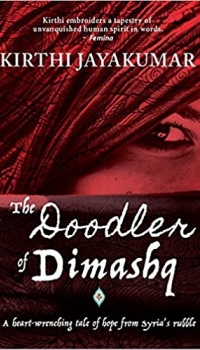Has your life ever been shattered by bombs showering sudden death and destruction? Probably not. Unfortunately, mine has. Therefore when I was reading The Doodler of Dimashq, the narration of fear, panic, disorientation of everything familiar, the whittling down of life’s irrelevancies to the basics was like taking a trip down memory lane.
When I was able to extract myself from the déjà vu capsule, it suddenly struck me that Kirthi Jayakumar, the author, was not writing from personal experiences of living inside a war-torn zone. However, the way she has portrayed the choking terror, grief and resignation of people hit by a calamity is uncomfortably close to reality. I was amazed at her ability to live their experiences and feel their angst despite her own physical and mental distance. Obviously, she had breached the emotional void and was one with them. This extraordinary facet of the author reveals a compassion so deep that she can relate acutely to painful sensibilities not experienced in her own life. Not only that, She can make the reader vicariously live through the utter desolation, sorrow and poignancy of people as ordinary as you and I who can hardly comprehend why death and devastation have decided to be their uninvited and unwelcome house guest. Her telling sucks you into a vortex from where it is difficult to extricate yourself.
She writes, ‘Do you know what a city looks like after it has been bombed? It looks like a cadaver---twisted, broken, bent out of shape, wounded. The blood of millions flow as whole generations come to an end, mingling with the dust of the ancients as buildings crumble to dust.’
Yes. Bombed cities do look like cadavers. I have seen it. But has Kirthi seen it? How does she know? Where does this deep perception come from?
Another aspect of her story telling that stuns me is her deep understanding of human nature. When the living conditions are so devastating that people are down to their last reserves of resilience, when there is no succor in sight from their terrible daily existence, when darkness is an endless tunnel and each time a bombing is over, all one says to oneself is ‘I have been allowed to live for a little more time,’ then something so simple as doodling and drawing your thoughts can serve as an anesthesia to pain is a more than a brilliant idea. It is a revelation of how well Kirthi has studied the workings of the human mind in severe crisis. It displays an innate understanding of human nature as well as wisdom beyond her years.
Thus she is able to demonstrate the consonance in the enduring unanimity of human courage. Read this description of children ravaged by war trying to alleviate pain by doodling their memories in ink and paper:
‘A strange kind of misery united us…their eyes growing moist and dreams sinking deeper and deeper behind cloudy mists of tears, their little foreheads creased in concentration as they tried to summon lost memories, of faces that would fade with time, of people whose names they would know, but nothing more…Just seeing all of it made me realize that without even having to seek their names or their stories out myself, I had built bonds…’
I cannot end without applauding Kirthi's skill at twisting language in ways which make it a metaphor to the unusual setting of her wartime scenario. Read this: ‘You are like every grain in the sands of time. You are everywhere, nowhere, somewhere, all the time.’ People caught in the storms of war are acutely aware of their insignificance against the backdrop of catastrophe. But constantly courting death also sharpens intuitions to realize that the spirit is indestructible and it will live on somewhere, everywhere. Sometimes it is this thought that makes one go on…from one breath to the other.
Kirthi has this uncanny capacity to use her sage idioms and illustrations like beams of light to cut through the gloom of despair. I salute this young author for her sensitive and unique depiction of the mettle and perseverance of people with no choice but to live in a war zone. At the end of the story, I am left with the grim reminder that this not about people and events happening far away...elsewhere. It can happen to me…to us anytime, anywhere. Let’s be prepared for it, if possible. Let’s not live in the illusion of ‘It happens to other people not to me’. Let’s appreciate the gifts of an ordinary, unexciting life happily as long as it lasts.
The Doodler of Dimashq has a gamut of takeaways and lessons to be learned. I would recommend it as essential reading for all of us living in the unpredictable 21st century.
All rights reserved. @Sutapa Basu 2018
